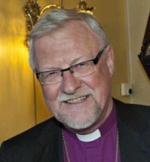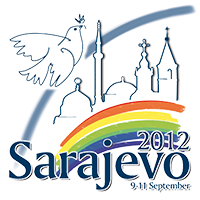
|
For some years I have been challenged by the emphasis of Sant’Egidio upon “friendship with the poor”. To be personal, it has also changed my life and my ministry as a bishop. When I was given the topic of this panel, my immediate reflection went in two directions.
The first relates to the millennium goal of the UN. The economic poverty in today’s world is so vast and creates so much suffering, that the need for practical action to reduce poverty gets more and more urgent day by day.
My parallel reflection was to recall the words of Pope John XXIII when he launched the Second Vatican Council 50 years ago: “The Church is for all, and especially the poor.” Behind these words is a different vision of community and togetherness than the one dominantly present in our consumer societies.
With these two points of departure, I have to be more specific, and I will share with you some experiences and reflections from my own Norwegian and North-European context.
Roma in Oslo
In the last years a growing number of Roma people have come to Oslo and Norwegian cities. They come with the hope of finding odd jobs, but most of them end up begging in the streets. The authorities do not allow them to sleep in parks, squares or streets, nor do they provide a place for them to put up their tents and feeble huts. This summer their presence in our cities became a big media issue, and a fierce public discussion has followed. Some politicians are now proposing a ban on begging, wanting to keep the Roma away from our country. It seems Norway is like most European countries, excusing themselves for not acting and leaving to Brussels’ bureaucrats to solve this “poverty problem”.
In this situation, however, there are contrasts. The Salvation Army, our City Mission and churches have taken the initiative to improve the situation of the Roma while they are in Norway. When I recently visited a group of Roma people on the outskirts of Oslo, a picture emerged which was different from the “problem” presented by the media and discussed by our politicians.
A private proprietor had given them a possibility to camp in an area between a neighborhood of villas and the forest. When I came, a young lady started to play an accordion, and they started to sing and dance. They shared and wanted me to taste the food they had prepared for their evening meal. Some asked for a blessing, and we prayed together. It was an extraordinary evening and experience of fellowship and joy. But I must also add that some days after this event, they were also banned from this area.
Poverty is a reality with many shades. When I focus upon the Roma people in Oslo, it is because they today give face to a growing poverty in our societies – not only economic poverty, but social discrimination and a poverty crossing national boundaries. How do they question us, and what is our response?
Do you see me?
In our affluent society there is a tendency and a hidden desire to conceal the poverty that disturbs our esthetic vision and consumerist mentality. It is not pleasant to be reminded by beggars of their struggle for survival when one is surrounded by shops and an environment overflowing with wealth. When we add to this the negative attitudes to the Roma people and the historic discrimination of them in European society, it is appalling that our authorities still try to find measures to move them out of our sight. When today I encounter beggars in our streets, I try to remind myself that their request for money also involves a deeper question: Do you see me?
The Bible has a word for this situation, a response to this challenge: not to bend justice for the stranger, the fatherless or the widow, but to be open-handed towards the poor and the needy. (Deut. 27, 19; 15, 11). This is the biblical challenge to us as, a call to live and share with the poor and the needy, including the Roma in our midst. Therefore we also have to stand together with them and to challenge our authorities to provide space also for the Roma so that they may live with us and we with them – in dignity. In this there is even a more fundamental challenge.
Our common humanity
In my encounter with Roma people I have been overwhelmed – not only by their kindness and fellowship, but by a deep awareness of our common humanity. No politician should make decisions related to their situation without getting to know them, listening to their stories and sharing - not only their sorrows, but also their joys. Indeed, on this point I have detected a different kind of challenge from the Roma people. Those who get to know them, soon discover a fellowship where people naturally care and take responsibility for one another, a fellowship which treasures family and family traditions – values often missing in our individualistic societies.
But there is no need to paint a romantic picture of the singing and dancing poor. Poverty is never romantic. The Roma people certainly have suffered enough, and they struggle as we do, including with crime in their midst. But what I am after, is to go beyond the picture of “a problem” as it is perceived in our societies, and get to the human lives involved. If culture and context differ, their sorrows are our sorrows, our joys are their joys, and we share the same longing and dreams – for our children, our families and ourselves. Instead of acting as omnipotent societies that either take over the lives of individuals and groups or close the doors for them, we are challenged to work together and live together, to confront the problems and face the future together. We have to begin by seeing one another and living together, discovering in one another a sister or a brother created in the image of God.
Who are the poor?
This panel is about the poor questioning us. Before concluding, I have to ask another fundamental question: “Who are the poor?” We know that Jesus identified with the poor so much that he called himself poor and stranger, prisoner, sick and hungry. Christians in the first centuries therefore used “poor” as a designation for themselves. They called and regarded themselves as “poor”, with open doors to a different kind of community and togetherness.
Having spoken of Roma-people and beggars in Oslo, I also have to quote the father of the Protestant Reformation, Martin Luther. When he died in 1546, they found a note beside his bed, his last testimony: “We are all beggars.” In these words, as well in those from Jesus, the Early Church and Pope John XXIII lies a profound recognition: In front of God we are all poor beggars, and what God in his mercy gives to us and provides for us, is for us to share with one another – to his glory!
Here in Sarajevo and in this Balkan context I therefore conclude by recalling one little lady who more than anyone in recent times has reminded us of the challenge of the poor and about living with the poor: Mother Theresa. She said about herself: "By birth I am an Albanian, and by citizenship an Indian. By faith, I am a Catholic nun. As to my calling, I belong to the world. As to my heart, I belong entirely to the Heart of Jesus.” Today I see her face as a shining light and a provocative challenge from a follower of Christ among the poor. It is a challenge with hope for our future - living together.
|

